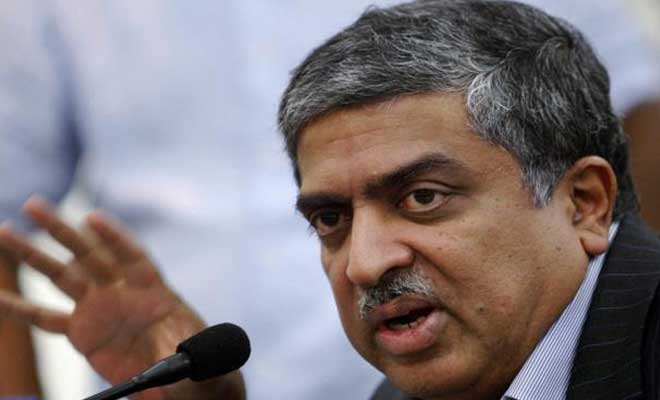By Sharon Thambala
Bengaluru– The global software major was absolutely right in concealing the whistleblowers’ complaints from the regulators and the media, Infosys chairman Nandan Nilekani has said.
“It is not the job of companies to take a whistleblower’s complaint coming every morning and issue a media release on it.
“That is going to create a new set of issues. So, we did absolutely the right thing,” Nilekani told IANS, which red-flagged the complaints in October and the co-founder acknowledged it later.
Admitting that a company was duty-bound to take on record a whistleblower’s complaint, Nilekani said a report was made on it (plaint) after due diligence and investigation by an audit committee, set up to probe the charges against its Chief Executive Officer (CEO) Salil Parekh and Chief Financial Officer (CFO) Nilanjan Roy.
Based on the findings of the audit committee, Nilekani claimed on Friday (January 10) that there was no wrongdoing by Parekh or Roy in the financial dealings with its global clients.
Infosys’ audit committee arrived at this conclusion after investigating 77 people, including some employees, through 128 interviews on the myriad allegations.
The company entrusted 46 custodians to collect relevant documents and electronic data which ran into 2,10,000 documents, amounting to 8 tera bytes data.
In the audit committee key findings, explaining an unnamed large deal, the report said the reasons for choosing Percentage of Completion (POC) cost method were neither discussed nor disclosed to the audit committee. It said no evidence was found to say that POC method was forced for recognition of application maintenance revenue.
“The company notes that it has historically applied the straight line method (SLM) of revenue recognition for substantial majority of its fixed price maintenance contracts,” said the audit committee report.
It also said that POC method adheres to the company’s accounting policy, therefore, no specific disclosure was required to be made to the audit committee.
“Revenues from such maintenance contracts where this method has been applied are not material and hence, a separate disclosure in the financial statements was not considered necessary,” claimed the report.
Before briefing the media on the company’s third quarterly results, Nilekani absolved Parekh and Roy of all the charges as the audit panel gave a clean chit to them on the grounds that they (allegations) were unsubstantiated or not backed by evidence by the whistleblowers.
“I am pleased that after rigorous investigation, the audit committee has found no wrongdoing by the company or its executives,” reiterated Nilekani.
The audit committee roped in legal counsel Shardul Amarchand Mangaldas & Co and PricewaterhouseCoopers to inquire into the charges.
Nilekani also asked the media what evidence it had to know that the whistleblowers were the company’s employees, as claimed by one of them working in the company’s finance department.
When asked about the safety of the employees who raised the concerns over the lack of transparency in deals with the clients, Nilekeni said the company had no plans to identify the whistleblowers or the unethical employees.
“That will vitiate the purpose; we are not going around looking for whistleblowers. We have no intention of finding them or doing anything about that,” added Nilekani.
On October 21, 2019 a complaint to the company board purportedly from unidentified ‘ethical employees’ came to light, accusing Parekh and Roy of serious misconduct and unethical practices.
Nilekani’s defence for not informing the regulators (SEBI and SEC) about the plaints forced the whistleblowers to share them with the media that resulted in its blue-chip scrip of Rs 5 face value (per share) plunge 17 per cent on October 22, wiping off a whopping Rs 50,000 crore of its market capitalization in a single day.
The gravity of charges also made Nilekani step into the imbroglio and admit to the media that an unnamed board member received two anonymous complaints on September 30 and another on September 20 titled ‘Disturbing unethical practices’ and the second undated with the title, “Whistleblower complaint’.
The BSE sought a clarification on October 23 from the $11-billion IT behemoth over the non-disclosure of the complaint.
“We work with a large number of regulators and stock exchanges. We are in constant touch with all the regulators and other agencies. We are giving them full cooperation, we are keeping them fully up to date and we will take those discussions to the logical conclusion,” said Nilekani.
In spite of knowing about the charges, especially far more serious against the CEO, the outsourcing firm chose to keep them under wraps till the whistleblower raised the alarm, making it file a slew of clarifications on the BSE.
“It is observed that Infosys has not made disclosures under regulation 30 of SEBI (LODR) Regulations, 2015, w.r.t. receipt of whistleblower complaint mentioned in the announcement,” said the BSE to the company on October 23.
Similarly, the US regulator SEC (Securities and Exchange Commission) on October 24 initiated an inquiry into the charge of unethical business practices by Parekh and Roy.
“We have been in touch with the SEC on the anonymous whistleblower complaints and has learnt that the SEC has initiated an investigation into this matter,” said the beleaguered company in a statement on October 24.
On November 12, IANS reported on the second whistleblower’s letter to the board detailing Parekh’s alleged misdeeds and urging the Chairman (Nilekani) and the Directors to act against the CEO.
Claiming to be an employee in the company’s finance department, the second whistleblower complained that he was unable to disclose his identity fearing retaliation for the damning disclosures he was making against Parekh.
“Though it is a year and 8 months since Parikh joined the company, he operates from Mumbai in violation of the condition that the CEO has to be based in Bengaluru and not Mumbai. What is stopping the board to insist on his movement to Bengaluru,” said the second whistleblower in the unsigned and undated letter to Nilekani and the Independent Directors.
On December 12, the Schall Law Firm, a shareholder rights litigation firm based in Los Angeles, announced the filing of a class action lawsuit against Infosys.
The Schall Law Firm said Infosys made false and misleading statements to the market and used improper recognition of revenue to boost short-term profits. It encouraged investors with losses in excess of $100,000 to contact the firm.
The class action lawsuit against Infosys was for violation of 10(b) and 20(a) of the Securities Exchange Act of 1934 and Rule 10b-5 promulgated there under by SEC, said the law firm.
The SEBI, SEC and American law firms’ probe results are awaited. (IANS)







